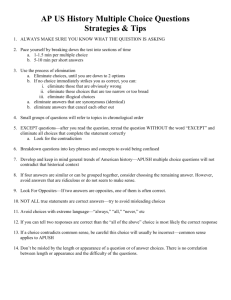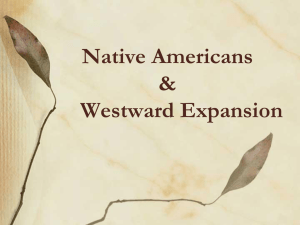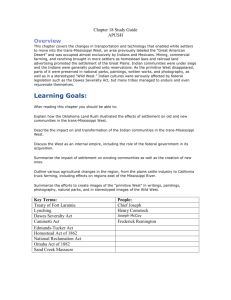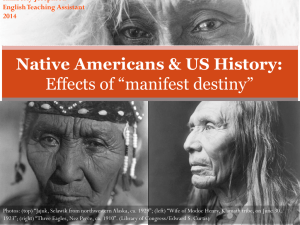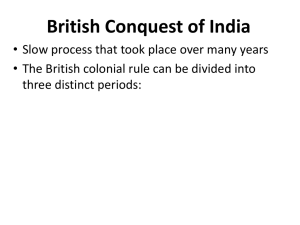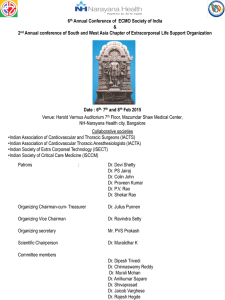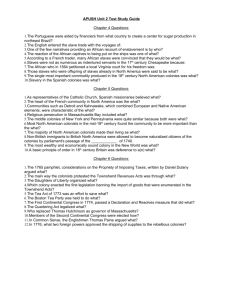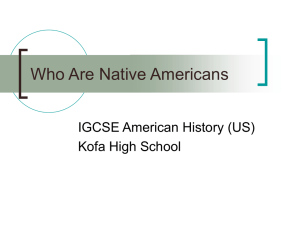Tuesday, January 13, 2015
advertisement
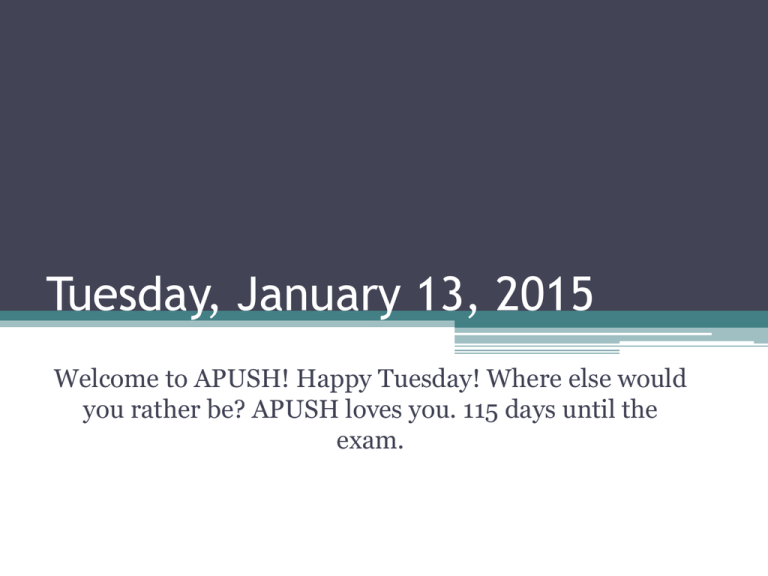
Tuesday, January 13, 2015 Welcome to APUSH! Happy Tuesday! Where else would you rather be? APUSH loves you. 115 days until the exam. Key Concepts • Key Concept 6.2, II, B: “The competition for land in the West among white settlers, Indians, and Mexican Americans led to an increase in violent conflict.” • Key Concept 6.2, II, C: “The U.S. government generally responded to American Indian resistance with military force, eventually dispersing tribes onto small reservations and hoping to end American Indian tribal identities through assimilation.” Document #1 Document #1 • 1. What is the message of the excerpt? • 2. What is the author’s point of view of Native Americans? • 3. What is another “dance” that the Native Americans performed that was viewed negatively by the US government? Document #2 • Tell General Howard that I know his heart. What he told me before I have in my heart. I am tired of fighting. Our chiefs are killed. Looking Glass is dead, Tu-hul-hil-sote is dead. the old men are all dead. It is the young men who now say yes or no. He who led the young men [Joseph's brother Alikut] is dead. It is cold and we have no blankets. The little children are freezing to death. My people -- some of them have run away to the hills and have no blankets and no food. No one knows where they are -- perhaps freezing to death. I want to have time to look for my children and see how many of them I can find. Maybe I shall find them among the dead. Hear me, my chiefs, my heart is sick and sad. From where the sun now stands I will fight no more against the white man. ▫ Chief Joseph at his surrender, 1877 Document #2 • 1. What is the message of this document? • 2. What were reasons for conflicts between Natives and the US government? Document #3 Document #3 • 1. Describe the map: • 2. Why were RRs built during this time? • 3. How did the government encourage RR development? Document #4 • “The President of the United States…hereby is authorized, whenever in his opinion any reservation or any part thereof…is advantageous for agricultural and grazing purposes…to allot the lands in said reservation in severalty to any Indian located thereon in quantities as follows: • To each head of family, one-quarter of a section; • To each single person over eighteen years of age, one eighth of a section; • To each single orphan child under eighteen years of age, one eighth of a section… • Every Indian born within the territorial limits of the United States to whom allotments shall have been made…who has voluntarily taken up, within said limits his residence separate and apart from any tribe of Indians therein, and has adopted that habits of civilized life, is hereby declared a citizen of the United States.” • The Dawes Severalty Act, 1887 Document #4 • 1. What was the purpose of this act? • 2. How did this act change Native American lifestyle? • 3. What does assimilation mean? What were other ways the US sought to assimilate Native Americans? Document #5 Document #5 • 1. Purpose of the Ghost Dance, GO! • 2. How did the US government respond? Big Idea Question • Why did the US increase westward expansion postCivil War, and how did this impact Native Americans?



